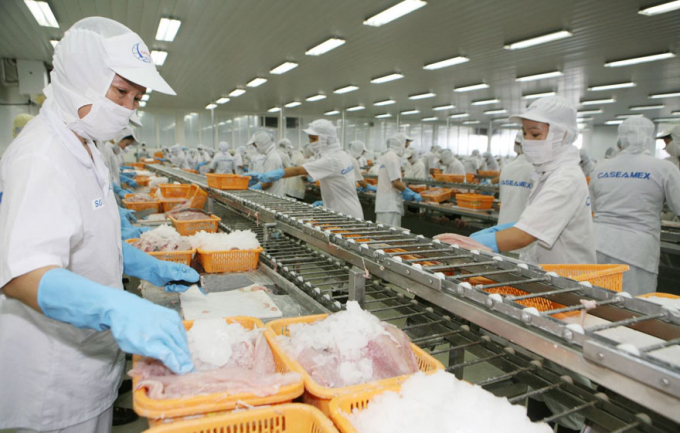November 28, 2025 | 01:52 GMT +7
November 28, 2025 | 01:52 GMT +7
Hotline: 0913.378.918
November 28, 2025 | 01:52 GMT +7
Hotline: 0913.378.918

VASEP proposes increasing the maximum yearly overtime hours to compensate for the serious labor shortage due to the pandemic. Photo: TL.
The Vietnam Association of Seafood Exporters and Producers sent an official dispatch to the Ministry of Labor, War Invalids and Social Affairs contributing ideas to develop the Resolution on overtime hours.
Accordingly, when provinces/cities implemented social distancing under Directive 16, up to 70% of seafood processing factories had to stop production in the past 2 months, only about 30 % of the factories produced in moderation in compliance with “3 on-site”, “1 route – 2 destinations”.
The reason is that businesses cannot arrange accommodation for workers while implementing "3 on-site", "1 route - 2 destinations"; businesses suffer from labor shortages due to social distancing measures by provinces and cities preventing workers from going to work; they suffer from a shortage of raw materials and auxiliary materials in the export production supply chain due to difficulties in transporting goods between provinces.
These problems put seafood businesses at risk of breaking production supply chains, losing customers due failing to provide enough orders for customers.
Therefore, VASEP agreed to remove the limit on the overtime hours in a month to facilitate flexible production, in order to meet orders and deal with the labor shortage due to the Covid-19 pandemic.
VASEP proposed to increase the maximum overtime hours in a year from 300 hours to 400 hours, regardless of the manufacturing industry, to compensate for the serious labor shortage caused by the Covid-19 pandemic.
VASEP also proposed to temporarily remove the regulation on overtime organization under Article 62, Decree 145/2020/ND-CP. When an business has a plan for overtime work, it only needs to be based on an agreement between the employee and the employer.
This will help businesses be more proactive in arranging overtime plans depending on the actual situation of the business in terms of raw materials and labor force. The business is responsible for managing and organizing overtime in accordance with the provisions under the Resolution and is responsible for post-audit.
Translated by Nguyen Hai Long

(VAN) After the institutional merger, Da Nang possesses significant forest-carbon reserves and is proactively engaging in the carbon market, creating a new revenue stream.

(VAN) An Giang strengthens communication against IUU fishing, increases inspections and sanctions, and is determined to remove the EC’s “yellow card” while developing a sustainable fisheries sector.

(VAN) As green transition becomes a global trajectory, Viet Nam’s biggest challenge is not only technology and models, but how to ensure that capital flows reach the right beneficiaries.

(VAN) The Ministry of Agriculture and Environment must spearhead the construction of green governance, spanning decision-making processes and investment standards to policy evaluation mechanisms.

(VAN) The Agriculture and Environment sector of Khanh Hoa has achieved numerous milestones over the past 80 years, contributing significantly to the goal of establishing the province as a centrally governed city by 2030.

(VAN) Viet Nam is entering the pivotal period of 2025-2030, moving toward the formulation of the Remote Sensing Law, which will establish a legal foundation for the development of national digital data.

(VAN) The agricultural sector is finalizing the strategic framework for emission reduction, setting the goal of sharply cutting methane and 403.7 million tons of CO2 equivalent and moving toward Net Zero by 2050.